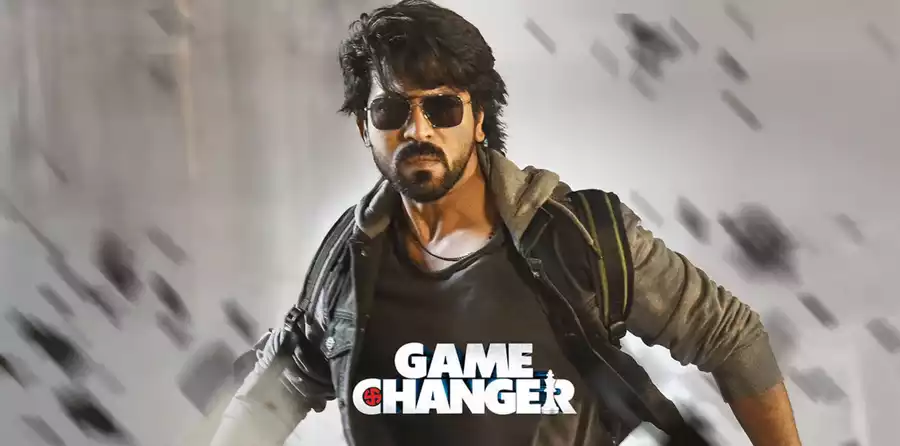The film does not have a single highlight, and the big budget does not translate into an interesting story or involving characters. The rest of this review contains spoilers.
Sometimes, when you visit someone’s house, you see a wall with certificates and records of achievements. It’s as though the person is reminding us that these are peaks that he or she has scaled in life. Shankar does something similar through his visuals and plotlines in Game Changer. He gives us a cleavage joke and reminds us of Gentleman. He shows us an invisible man with dancing shoes and says: “I am the filmmaker who made Kadhalan.” He gives us the back-and-forth finger-roll on a bald head and reminds us of Sivaji. He gives us a spin on the “one-day CM” concept and reminds us of Mudhalvan. In the Jaragandi song sequence, he gives us the coloured roads and houses and a million dancers. He gives us drones that recall the Robot films. What he forgets to do is make us remember why we regarded him so much.
Take Mudhalvan. Manisha Koirala is the heroine, and she is not just a dancing doll. She is worked into the narrative because her father does not want the CM for a son-in-law. And even when the chessboard song occurs, it is a reflection of how the hero’s busy schedule is making the heroine miss him. Game Changer gives us that chessboard in the opening credits, but we don’t get the emotional beats. We get Kiara Advani as a doctor, but she’s really just a dancing doll, hanging on to Ram, the protagonist played by Ram Charan. Or maybe she’s another Shankar homage. Maybe she’s really a robot, given that she keeps transforming herself: from a medical student to someone who runs an old-age home to an election-booth supervisor. There’s a half-hearted attempt to tell us that she helped Ram conquer his anger, but these scenes are so predictably written that we’d not miss this angle even if it had been dropped.

“Predictable”. That is the word that kept coming to mind over and over and over. When someone in a flashback is betrayed by a best friend, or when a father is killed by his ambitious son, you don’t feel the shock. You are just waiting for the scenes to get over, because you can predict what’s going to happen for the next five minutes, for the duration of the sequence. When Ram, who is a collector, enters a godown filled with rice bags, you can predict that he will discover corruption, that some of the rice will be adulterated. In fact, fifteen minutes into the movie, you can predict your itch for a fast-forward button, because nothing is new. Shankar keeps throwing supposedly sensational things at us. A flyover falls down, a mall explodes, people keep flying off into the air, Ram says he does not want to get married – but nothing works.
It’s hard to find any signature of Karthik Subbaraj in all this. He apparently wrote the story, and to be fair, there is an interesting thought in it. What if an ambitious man, who climbed his way up with crimes, now repents his actions and wants to make amends? This could have resulted in a wonderful masala story with mythical undertones. It’s like Dasharatha after he banished Rama to the forest. What if Dasharatha wanted to make things right? And what if, like Krishna, our protagonist was born in one family and was raised in another? But nothing is developed seriously in Game Changer. In fact, the screenplay cares so little about the people in it that when Ram discovers who his real mother is, we don’t even get a reaction from the mother who raised him, or any details about how he ended up with this new family.
Shankar still thinks up a few decent things, like a bit about the line that separates two districts or a subplot involving money-free politics. But many of these bits aren’t developed interestingly, like an assistant who walks sideways or a dance in the middle of the street that’s supposed to make Ram get rid of his anger. What could have been highlights end up looking odd and childish and tonally inconsistent. For instance, what is the point in making Ram a less angry man if he is going to spend the entire second half in a state of rage? Plus, who wouldn’t end up in a state of rage having to face lines like this one: “Don’t exhibit anger. Execute it.” Say what! SJ Suryah tries his best to infuse some energy into his scenes, and into the film, but again, his villainous character is so predictable that nothing comes as a surprise. The political cat-and-mouse games this character plays with Ram should be thrilling. They’re just boring.
Even the famous “Shankar flashback” ends up a damp squib. Instead of adding a solid emotional foundation to the film, the predictability merely tests your patience. Shankar tries something new with the editing, wherein the entire reason for an action sequence is shown as a quick insert in a tiny flashback before we return to the present. But this kind of cutting only ends up emphasising how flimsy and generic the reason for the fight was. Plus, the quick cuts damage the dramatic potential, because there is no stay in the scenes that matter. Ram Charan isn’t bad, but there is the sense that he hasn’t fully bought into what Shankar is selling. In a way, he is like the audience. Game Changer makes you glad that Shankar’s next project is based on historical fiction, a book that’s already written and whose story will allow him to get away from his pet theme of corruption. If anyone needs to change his game, it’s Shankar, and the time is now.


